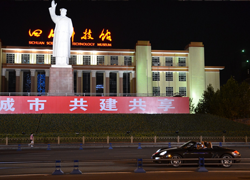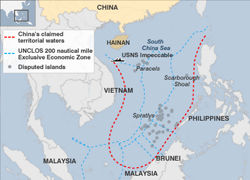
Upon reflection, two divergent themes emerged from Judge Xue’s lectures. Much of what she said made me realize that Western apprehension over China’s rapid ascension is somewhat misplaced and that the Chinese government is serious about using its power to improve the lives of its people. It gave me confidence that China is likely to be a constructive addition to the geopolitical balance. However, as an avid consumer of global news, some of what Judge Xue argued rang hollow against the backdrop of the free media’s coverage of China’s practices. I attempted to reconcile this discrepancy through the Chinese concept of mianzi.
Mianzi is best translated in to English as “face,” in the metaphorical sense in which a person can “save face.” Due to my aunt and uncle having lived in Shanghai for over five years, I knew that this translation was not perfect; the concept means slightly different things in China than it does in the West. Not only is saving face more important in China, but the way in which one saves face is also slightly different.
The clearest example of this discrepancy that I can find concerns a well-fed child carelessly knocking a vase off of the table while his parents are not home. In the United States, the child would simply blame it on the dog. If the American boy’s parents found out that he had lied, he would be punished both for breaking the vase and for lying about it. In China, by contrast, the careless boy would likely tell his parents that, while he did in fact knock down the vase, he did so because he skipped breakfast and a wave of dizziness came upon him. The Chinese boy is sorry that he forgot to eat breakfast. If his parents found out that he had indeed eaten breakfast, they would be upset about the vase but would understand why he had fabricated the reason for the accident. I opened Judge Xue’s closing seminar with a question about whether the concept of mianzi affected China’s behavior with respect to the international community.
Judge Xue began her answer to my question by thanking me for realizing the importance of Chinese culture in its conception of international law. But to my surprise, rather than openly discuss the differences between the Chinese and Western concepts of face, Judge Xue simply stated that all cultures have this concept and that it was basically a wash when it came to international relations. Nonetheless, it is my sense that Judge Xue’s lecture, and even her answer to my question, offer some insight into the concept of mianzi. While China has indeed been misunderstood by the West and criticized in an overly-harsh and unproductive way, where China’s footing is weak from an objective standpoint, is asserts full compliance, maintaining mianzi.
In concluding this six-part series, I will briefly summarize Judge Xue’s position on each major issue discussed in the lecture and discuss the extent to which Western criticism has been either unwarranted or is on point. I will also discuss areas where it is possible that Chinese denial of fault is based on its desire to keep face in the international community. I will conclude by suggesting that China’s reliance on mianzi is a cause for Western optimism.
History
When Chinese leaders make policy decisions, they do so not as purely objective actors but as Chinese citizens whose culture and self-identification color the choices they make. As such, China’s complex history of international relations – that of victim, outside observer, and finally active participant – has lead to a modern China that guards its sovereignty jealously and views the prospect of global governance with a skeptical eye. China’s historical claim is to be taken seriously and respected by the West. A globalized world must be able to tolerate state actors who do not share a common history and culture. This is a baseline criterion if the world is to move forward in a manner that favors peace and respects the rule of law. This is an area where Chinese perspectives and Chinese practice line up perfectly and Western criticism has been mostly off point.
Sovereignty

The Chinese conception of sovereignty is closely related to its history, but China’s contemporary record is more mixed when it comes to its sovereignty and that of its neighbors. On the one hand, Judge Xue’s pronouncement that sovereignty requires “supremacy internally and independence externally” is the primary basis for the international order and represents a major current of international legal scholarship. It is an appropriate position that Western countries should not only respect but also see in their own actions. On the other hand, China outwardly refuses to tolerate any exceptions to this rule while making exceptions of its own in the South China Sea. China’s official position on the South China Sea is that it has absolute sovereignty over its entirety. It is clear from a map of China’s claimed territory that such an assertion infringes on the sovereignty of Vietnam, Malaysia, Indonesia, Brunei, and the Philippines.
Sovereign equality is an inseparable part of sovereignty, and China must adhere to the UNCLOS boundaries, the only equitable solution to this dispute, if it in fact respects the idea that it claims to hold so dear. When China advances the notion that it has a sovereign right to the South China Sea that is contrary to the UN Convention on the Law of the Sea, it is pursuing its domestic self-interest and trying to keep face while doing so. China’s stated position regarding sovereign equality is sound, but Western pressure in the face of Chinese action violating its stated principles is warranted.
Sustainable Development
China’s response to Western criticism of its environmental record is two-fold. First, China maintains that the West must view Chinese actions in the context of the world’s largest developing country with the world’s fastest growing economy. Second, China asserts that the West must appreciate the fact that, while China takes sustainable development seriously, it refuses to sacrifice the practical well being of its citizens to satisfy the West’s goals related to protecting the environment. China bolsters its credibility through an historical record of addressing environmental concerns once they adversely affect the Chinese people. The West would do well to recognize that China is in a different stage of development than its European and North American counterparts, and only time will tell how China’s state practice surrounding sustainability stand up against its pronouncements. Every developed country went through a period of rapid industrialization on its way from an agricultural to a manufacturing economy, and if history is any guide, that period is necessarily coupled with a marked increase in pollution. There is no reason for the West to expect China’s development to proceed any differently.
Nonetheless, there is no guarantee that China will continue to follow the long-term Western historical pattern. In the Western framework, once an agricultural economy transitions into a manufacturing economy, a middle class begins to form. Then, a period follows in which industrial expansion and the growth of the middle class occur in lockstep. Once environmental degradation begins to adversely affect this newly empowered middle class, political pressure leads to environmental protection. According to Chinese pronouncements, this is exactly what the West should expect – China refusing to acquiesce to Western demands only to meet those same Western expectations in response to the needs of its own people. However, the Earth Policy Institute recently found that lung cancer is the leading cause of death in China. This is a highly abnormal phenomenon that can only be attributed to unprecedented air pollution. The needs of the Chinese people clearly call for an improvement in China’s environmental record. In this case, the coin is in the air as to whether China will admit that a change in course is needed to adequately protect its people. The West should give China a chance to live up to its stated expectation but criticize the nation if it fails to do so.
Human Rights
In her lecture on human rights, Judge Xue stressed China’s history of constitutional and administrative improvements as well as changes to the criminal justice system to show the country’s commitment to the promotion of human rights. Above all, the Judge emphasized the fact that China’s embrace of the market system has lifted 300 million people out of poverty and is a human rights achievement in itself. While the lack of the direct applicability of the Chinese constitution calls into question the positive effects of constitutional reform, the implementation of a civil system allowing citizens to sue the government and the modernization of the criminal code are real, concrete developments that have improved the humanitarian situation of the Chinese people. Moreover, it is true that human rights are paper rights without the economic means of enforcing them. As such it must be said that, in absolute terms, lifting 300 million people out of poverty over the course of 33 years is one of the greatest human rights achievements in modern history.

The Chinese have made impressive progress in some human rights areas, and it claims that it is working tirelessly to improve in all areas. However, an exchange between a colleague of mine and Judge Xue suggests that “steady pursuit of all human rights” may not be an accurate characterization of China’s path forward. My colleague asked Judge Xue to square her presentation on Chinese perceptions of human rights with news stories coming out of China of imprisoned dissidents, censored internet traffic, and lies about train wrecks. Judge Xue’s responded that China needed time to develop the capacity to provide for the human rights of all its citizens and that the government reserves the right to allow human rights to develop alongside economic rights. My colleague then tried to ask a follow up question distinguishing between positive and negative human rights but did not get very far. Nonetheless, my colleague put his finger on the key distinction between the acceptable and unacceptable aspects of China’s position on human rights.
China’s basic human rights argument is twofold. First, there is the economic argument that China has a sovereign right to spend its limited resources as its sees fit, putting economic development ahead of the promotion of human rights. Second, there is the cultural argument, says that because China is a collectivist society, Chinese citizens are willing to go without if doing so means that their children and grandchildren can live in a more prosperous country. This second argument is not really testable, but if it is true that the Chinese people have a strong collectivist mentality, China’s treatment of positive human rights should not offend the vast majority of the its citizenry. These two arguments may be successful when positive rights are at issue, but they fail with respect to negative rights.
These arguments hold with respect to positive human rights, which are rights with a corresponding obligation that something be given to the right-holder. Providing for rights such as education, health care, and protection from crime requires substantial resources, and China has a sovereign right to prioritize the way in which it uses those resources. China has chosen to focus on improving its economy and has proven that promoting economic development leads to the subsequent development of positive human rights for those benefitting from economic expansion. With respect to positive rights, China’s stated position is economically sound and appears to be culturally acceptable.
However, the both Chinese arguments fails with respect to negative human rights, which are rights with a corresponding obligation that something not be done to the right-holder. Filtering the internet, enforcing house arrests, and punishing dissidents not only deny Chinese citizens the negative human right not to be persecuted for peaceful expression nor denied access to information, they actually cost money to enforce. China’s economic argument is nonsensical when negative human rights are at issue. Their cultural argument also fails where negative rights are concerned. If China is truly a collectivist society, exposure to a small amount of dissident information should not change thousands of years of cultural tradition and end in riots on the street. And even if it does, do the Chinese people not have the undeniable right to change what they believe? While China should be free to pursue the positive rights of its citizens as it sees fit, the fact that it uses the same argument to justify deprivations of negative rights is pursuing mianzi in its most destructive form.
Concluding Remarks
In closing her lecture on sovereignty, Judge Xue stated that the central question for the international community is, “How should states with different systems and values interact with one another on the international stage?” She is right. The emergence of China as an international player may have prompted that question, but other developing nations such as Brazil and India will eventually join the fray. Most, if not all, of the values in the human rights regime of international law that emerged after World War II are universal, despite the fact that they were created by a group of individuals that was not demographically or culturally representative of the global population. However, history has made it clear that philosophy is not the sole driver of geopolitical developments. If the West ever wants the universality of these hard fought for norms to be realized, it must afford the international system the flexibility of incorporating other cultures’ current conceptions of those norms.
This will only happen if the West shows respect and deference to different histories and cultures of developing nations, letting reason trump both fear and prejudice. But developing countries must follow suit, and, while China should continue to center its positions on international law around the Five Principles of Peaceful Coexistence, it should realize that the principle mutual non-interference does not shield China from international pressure and that, under certain circumstances, the principle of “equality and mutual benefit” might require such pressure.
Mianzi plays a significant role in China’s pronouncements on international law. In the Western view, this assertion may carry a connotation of deceitfulness and untrustworthiness. That would be the wrong conclusion to reach and draws attention to the importance of cultural understanding in a diverse international community. The careless son lied because he cared what his mother thought about him. In a similar (though much less subservient) way, China seeks to keep face because it realizes that an interconnected world is one in which reputations matter. That fact alone is reason for the West to be optimistic as we enter this new, interconnected, and complex global order.


